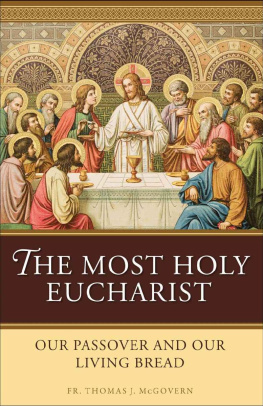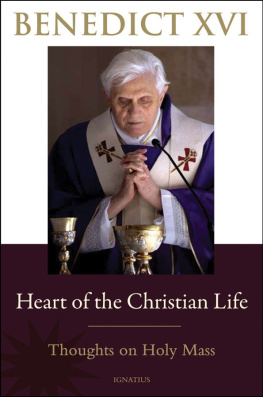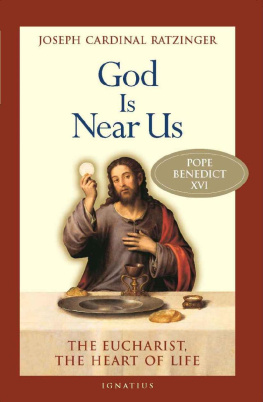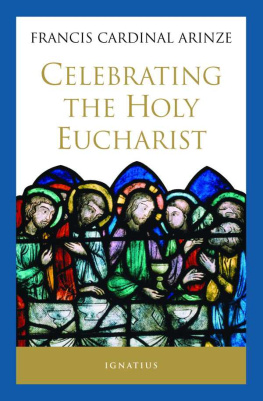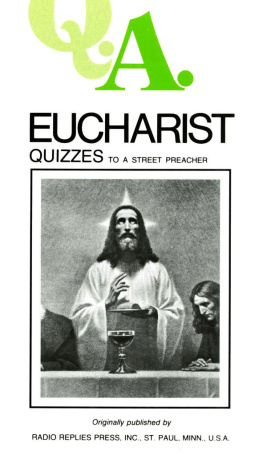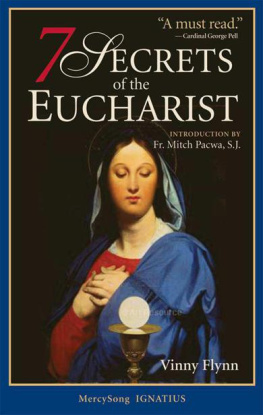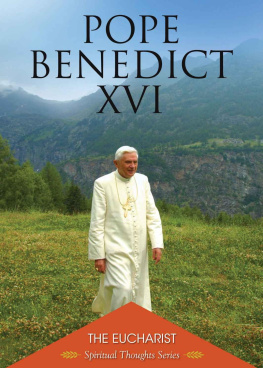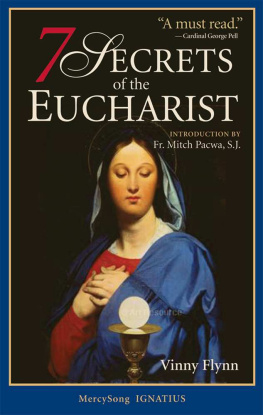Thomas J. McGovern - The Most Holy Eucharist
Here you can read online Thomas J. McGovern - The Most Holy Eucharist full text of the book (entire story) in english for free. Download pdf and epub, get meaning, cover and reviews about this ebook. year: 2013, publisher: Sophia Institute Press, genre: Religion. Description of the work, (preface) as well as reviews are available. Best literature library LitArk.com created for fans of good reading and offers a wide selection of genres:
Romance novel
Science fiction
Adventure
Detective
Science
History
Home and family
Prose
Art
Politics
Computer
Non-fiction
Religion
Business
Children
Humor
Choose a favorite category and find really read worthwhile books. Enjoy immersion in the world of imagination, feel the emotions of the characters or learn something new for yourself, make an fascinating discovery.
- Book:The Most Holy Eucharist
- Author:
- Publisher:Sophia Institute Press
- Genre:
- Year:2013
- Rating:4 / 5
- Favourites:Add to favourites
- Your mark:
- 80
- 1
- 2
- 3
- 4
- 5
The Most Holy Eucharist: summary, description and annotation
We offer to read an annotation, description, summary or preface (depends on what the author of the book "The Most Holy Eucharist" wrote himself). If you haven't found the necessary information about the book — write in the comments, we will try to find it.
The Most Holy Eucharist — read online for free the complete book (whole text) full work
Below is the text of the book, divided by pages. System saving the place of the last page read, allows you to conveniently read the book "The Most Holy Eucharist" online for free, without having to search again every time where you left off. Put a bookmark, and you can go to the page where you finished reading at any time.
Font size:
Interval:
Bookmark:
Fr. Thomas J. McGovern
The Most Holy Eucharist
Our Passover and Our Living Bread
SOPHIA INSTITUTE PRESS
Manchester, New Hampshire
Copyright 2013 Thomas J. McGovern
Printed in the United States of America
All rights reserved
Cover design by Carolyn McKinney
On the cover: Last Supper of Christ (3518135),
Renata Sedmakova / Shutterstock.com
No part of this book may be reproduced, stored in a retrieval system, or transmitted in any form, or by any means, electronic, mechanical, photocopying, or otherwise, without the prior written permission of the publisher, except by a reviewer, who may quote brief passages in a review.
Sophia Institute Press
Box 5284, Manchester, NH 03108
1-800-888-9344
www.SophiaInstitute.com
Sophia Institute Press is a registered trademark of Sophia Institute.
Library of Congress Cataloging-in-Publication Data
McGovern, Thomas J.
The Most Holy Eucharist : our passover and
our living bread / Thomas J. McGovern.
pages cm
Includes bibliographical references (pages ).
ISBN 978-1-933184-90-6 (pbk. : alk. paper)
ePub ISBN 978-1-622821-61-7
1. Lords Supper Catholic Church. I. Title.
BX2215.3.M34 2013
234'.163 dc23
2013003182
In grateful memory of those generationsof Irish men and women who,
despite a bitter persecution over a period of 250 years,
fought valiantly and successfully to maintain their devotion to the Holy Sacrifice of the Mass and the Blessed Eucharist,
in which endeavor many generously gave their lives,
laypeople as well as priests.
Contents
.
Introduction
The Eucharist is one of the great mysteries of our Catholic Faith. Down through the centuries it has been a constant source of spiritual nourishment for generations of Catholics and has filled their hearts with the joy of knowing that, in their Communions, they have received the very Body and Blood of Christ.
In his first encyclical, Redemptor hominis , Bl. John Paul II reflected on the unfathomable dimensions of this great truth:
The Church lives by the Eucharist, by the fullness of this Sacrament, the stupendous content and meaning of which have often been expressed in the Churchs Magisterium from the most distant times down to our own days. However, we can say with certainty that, although this teaching is sustained by the acuteness of theologians, by men of deep faith and prayer, and by ascetics and mystics, in complete fidelity to the Eucharistic mystery, it still reaches no more than the threshold, since it is incapable of grasping and translating into words what the Eucharist is in all its fullness, what is expressed by it and what is actuated by it. Indeed the Eucharist is the ineffable Sacrament!John Paul II is telling us that there is still much to learn about the Eucharist, that our knowledge still reaches no more than the threshold; yet we can say that the Church, in her living tradition, treasures a great deal of eucharistic wisdom and has a well-developed eucharistic liturgy.
As John Paul II prepared for the Jubilee Year, he wrote in the Bull of Indiction convoking this event for the year 2000:
For two thousand years, the Eucharist has been the cradle in which Mary has placed Jesus, entrusting him to the adoration and contemplation of all peoples, that, through the humility of the Spouse of Christ, the glory and the power of the Eucharist may gleam all the more that Eucharist that the Church celebrates and preserves at its heart. Under the sign of the consecrated bread and wine, Christ Jesus, risen and glorified, the light of nations (Lk 2:32), reveals the continuation of his Incarnation. He is still risen and alive in our midst, to nourish believers with his Body and Blood.Love reaches its ideal in the eucharistic sacrament. It is a unity that assimilates us more and more to Christ, and through total identification with the suffering Christ, it leads to real holiness. As well as identifying us with Christ, Holy Communion is food and does for the spiritual life all that material food and drink do for the bodily life, namely to sustain, increase, restore, and delight.
I have not tried in these pages to write a textbook on the Eucharist or to cover every aspect of it. My primary objective is to provide a book that will help people grow in love for the Mass and for the Blessed Sacrament. To deepen Eucharistic devotion, however, requires a solid theological basis. Hence the first five chapters cover the basic doctrinal aspects of this mystery. The next two chapters focus on devotion to the Blessed Eucharist, during Mass and outside of it.
Blessed John Paul II made an outstanding contribution to eucharistic theology during his long pontificate. In chapter 8, I have summarized the main points of this contribution, basing my study mainly on John Paul IIs principal documents on the Eucharist. In chapter 9, I have reviewed the Eucharist in the teaching of Pope Benedict XVI, who made a significant contribution to the Churchs teaching on the Eucharist.
Chapter 10 is a study of the main liturgical elements involved in the celebration of the Mass. Finally, chapter 11 is an examination of the commitment to the Mass in Ireland during times of severe religious persecution. It has much to say about the nature of this sacrifice and about Christian loyalty to it.
I would like to thank Fr. Charly Connolly and Fr. Tom OToole, who read through previous versions of this text and offered many helpful suggestions and ideas.
Fr. Thomas J. McGovern
Bl. John Paul II, Encyclical Letter Redemptor hominis (March 25, 1979), no. 20. Bl. John Paul II, Bull of Indiction of the Great Jubilee of the Year 2000 (November 29, 1998), no. 11. St. Thomas Aquinas, Summa Theologica , III, Q. 79, art. 1; cf. Catechism of the Catholic Church (CCC), nos. 13911401.Chapter 1
The Scriptural Foundations of the Eucharist
The Eucharist Rooted in the Old Testament
We begin our study of the Eucharist by examining the different texts in Sacred Scripture about this great sacrament, because Scripture is the primary source of the Churchs teaching about the Eucharist as sacrament and sacrifice. We will consider the scriptural sources in some detail because in them we listen to the words of Christ himself.
The meaning of the Eucharist is rooted in the faith of the people of the Old Testament, especially in the doctrine of the covenant. The covenant was a treaty to describe the relationship God established with the Chosen People. Gods new relationship with the Israelites was sealed with the pouring of blood (sacrifice) and the eating together of some of the sacrificial food (communion) (cf. Exod. 24:111). The blood was sprinkled on both the altar (symbolizing God) and the people: I will be their God and they shall be my people (Jer. 31:33).
Our Faith tells us that Jesus is the mediator of the New Covenant (cf. Heb. 12:24). At the Last Supper he echoed the words of Moses: This is my blood of the covenant (Matt. 26:28), or This is the new covenant in my blood which will be poured out for you (Luke 22:20). By sharing the cup of the New Covenant we enter into this new relationship established by Christ, who poured out his Blood on the Cross. Jesus death is that of the Passover Lamb, the suffering servant of God, led like a lamb to the slaughter (cf. Isa. 53:7).
The paschal lamb of the Jewish feast was a promise and a figure of the true Lamb, Jesus Christ, immolated in the sacrifice of Calvary on behalf of the whole human race. He is the true Lamb who took away the sin of the world. By dying he destroyed our death; by rising he restored our life.
He is the Lamb of God, the one whose life, given for us and poured out for us, brings healing and peace. By our communion in the Body and Blood of Christ, we are drawn deeper into the community of the New Covenant. By partaking of the Eucharist we are united with the living Christ in his work of reconciliation (cf. 2 Cor. 5:1820). This Old Testament reference is summarized in the Catechism of the Catholic Church as follows:
Next pageFont size:
Interval:
Bookmark:
Similar books «The Most Holy Eucharist»
Look at similar books to The Most Holy Eucharist. We have selected literature similar in name and meaning in the hope of providing readers with more options to find new, interesting, not yet read works.
Discussion, reviews of the book The Most Holy Eucharist and just readers' own opinions. Leave your comments, write what you think about the work, its meaning or the main characters. Specify what exactly you liked and what you didn't like, and why you think so.

